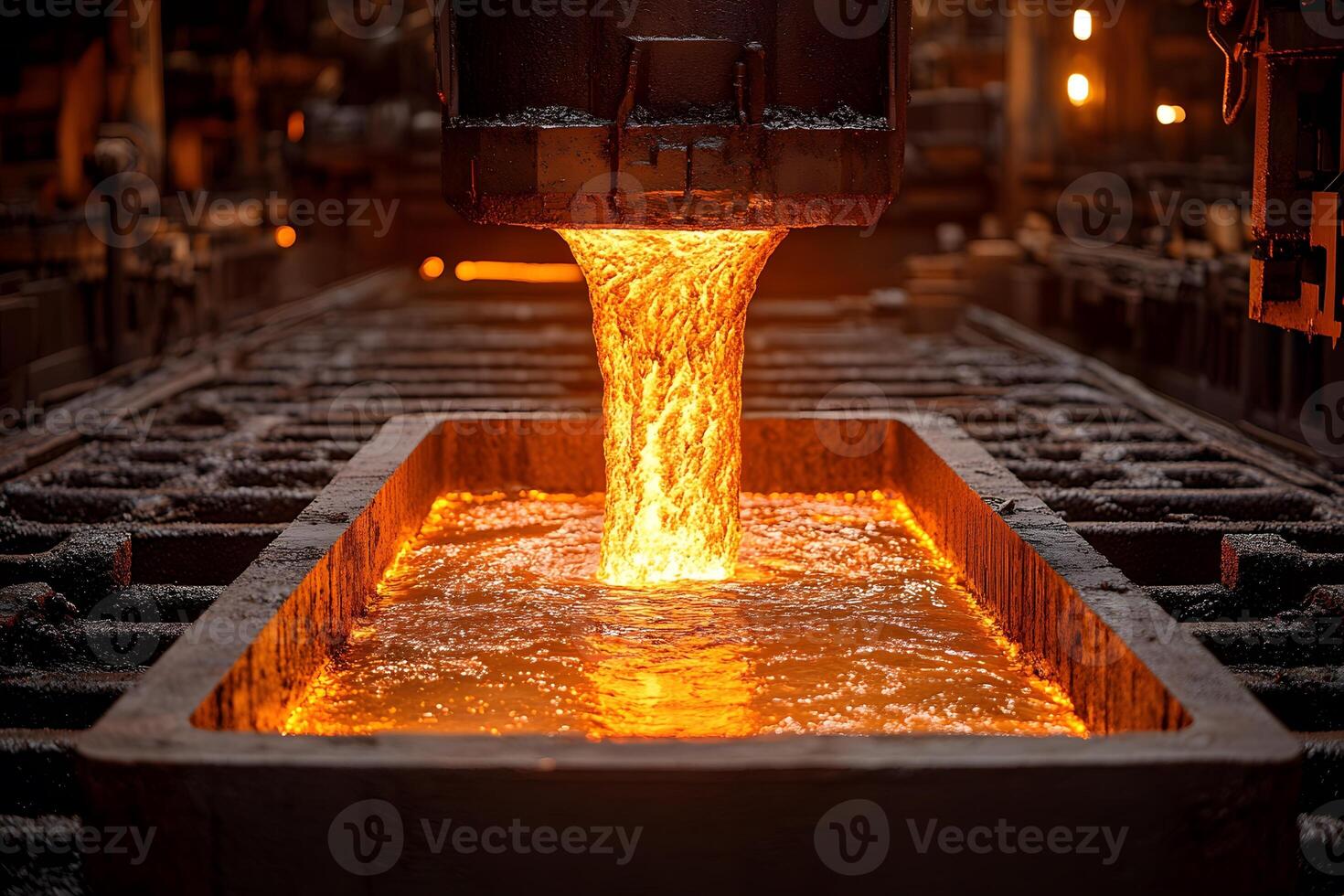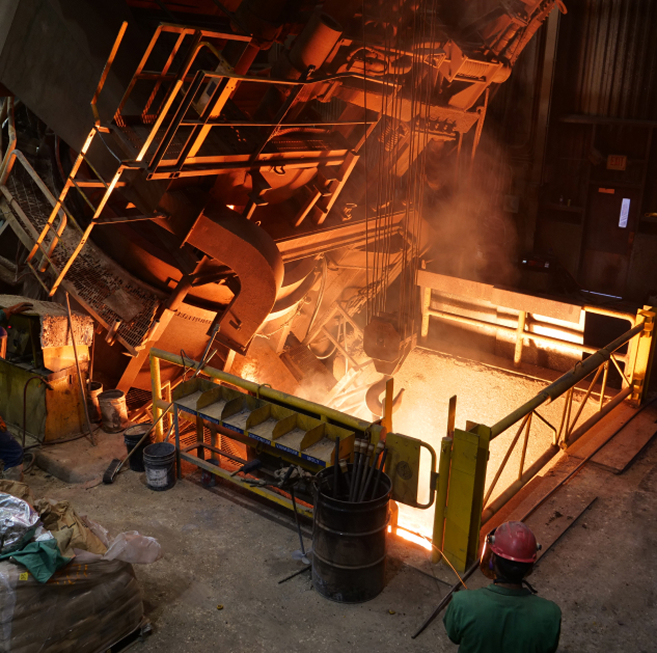Why Sustainability is Influencing the Future of Aluminum Foundry Operations
Wiki Article
A Comprehensive Guide to Metal Casting: Benefits and Services Offered by Foundries
Metal casting is an essential process in numerous industries, providing various advantages via the services of foundries. These facilities transform liquified metal right into specific and sturdy elements, catering to specific customer requirements. By using sophisticated modern technologies, foundries ensure high quality and effectiveness in production. However, the complexities of metal casting and the varied techniques involved increase vital inquiries about its function in modern-day production. What advancements exist ahead in this essential field?Recognizing the Metal Casting Process
The metal casting process is an essential method used in making to develop intricate forms and components. This method involves putting liquified metal into a mold designed to create the wanted item. The process begins with pattern creation, which functions as a design template for the mold and mildew. Aluminum Foundry. Various materials, such as sand, metal, or ceramic, are used for mold-making, depending on the specific requirements of the casting
Once the mold and mildew is prepared, molten metal is poured into it and enabled to solidify and cool. After solidification, the mold is eliminated, exposing the cast part. Different strategies, including sand casting, financial investment casting, and pass away casting, are employed, each suited to different applications and products. Quality control measures, such as assessments and screening, are vital to guarantee the end product meets specifications. On the whole, the metal casting procedure plays a crucial duty in generating parts for sectors ranging from automotive to aerospace.
Secret Advantages of Metal Casting
Metal casting offers significant advantages that make it a recommended manufacturing technique in numerous industries. Its layout adaptability and precision permit for complex forms, while cost-efficient mass production boosts effectiveness. Furthermore, the adaptability and strength of products used in casting add to the durability of the end products.Design Adaptability and Accuracy
Launching remarkable style versatility and precision, metal casting permits developers and engineers to develop elaborate shapes and attributes that would certainly be tough or impossible to achieve with other producing techniques. This capacity enables the production of intricate geometries, inner frameworks, and great information that boost product functionality and visual appeals. Additionally, different casting techniques, such as sand casting, financial investment casting, and pass away casting, give further choices for customization, fitting diverse product residential or commercial properties and job demands. The flexibility of molds permits modifications throughout the layout stage, improving the change from concept to last item. Ultimately, metal casting stands out for its capability to provide high-precision parts, making it an important procedure in sectors ranging from automotive to aerospace and past.Economical Automation
Economical mass manufacturing stands as one of the key benefits of metal casting, making it possible for makers to create large amounts of parts at a lower expense each. This efficiency emerges from the capacity to produce detailed molds that can be recycled multiple times, significantly reducing setup and functional prices. Additionally, metal casting processes, such as sand casting and pass away casting, permit for high throughput, making it feasible to fulfill the demands of large manufacturing runs. The reduced material waste and energy intake better improve cost financial savings, making metal casting an appealing alternative for industries requiring mass components. Generally, the affordable nature of metal casting positions it as a favored technique for manufacturers going for economic efficiency in their manufacturing procedures.Product Versatility and Stamina
One of the standout features of metal casting is its impressive product adaptability, which permits using a vast array of steels and alloys. This flexibility enables suppliers to pick materials that finest suit their specific applications, from light weight aluminum and bronze to iron and steel. Each metal uses unique homes, consisting of varying levels of stamina, corrosion resistance, and thermal conductivity. As a result, metal casting can generate elements that meet rigorous performance demands across diverse sectors, such as automotive, aerospace, and building and construction. Furthermore, the strength of actors steels can be boosted through various therapy procedures, making sure sturdiness and long life. Metal Foundry. Generally, the combination of material convenience and integral strength makes metal casting a preferred option for generating top notch componentsSorts Of Metal Casting Strategies
Metal casting incorporates a range of techniques that cater to various production demands and product residential or commercial properties. Typical methods include sand casting, which uses a sand mold for complicated shapes, and investment casting, known for its precision and surface area coating. Die casting is another technique that employs high-pressure shot of molten metal right into mold and mildews, suitable for mass manufacturing of little parts.Covering molding uses a faster alternative, utilizing a resin-coated sand to develop thin-walled mold and mildews, while lost foam casting enables complex styles without the requirement for a core.
Furthermore, continuous casting is made use of for creating lengthy sections of metal, such as sheets or bars, by strengthening molten metal in a constant process. Each method presents unique benefits and is chosen based upon elements like the required information, production volume, and material kind, guaranteeing remarkable results in metal fabrication across numerous sectors.
The Function of Foundries in Metal Casting
Shops play an essential role in the metal casting procedure, working as the facilities where liquified metal is transformed into ended up items. These specialized facilities are equipped with the required tools and modern technologies to handle various metals, making sure premium end results. Factories are responsible for numerous vital functions, including melting the metal, pouring it into mold and mildews, and enabling it to solidify.In addition, they maintain rigorous safety and security and environmental requirements to shield employees and minimize eco-friendly impact. Skilled technicians and designers work together to maximize casting processes, enhancing performance and minimizing waste. Foundries additionally engage in quality assurance measures, making certain that the final products satisfy specific tolerances and specifications. This quality guarantee is vital for sectors that rely upon precise elements, such as automotive and aerospace. Consequently, foundries contribute substantially to the total production landscape, allowing development and growth across numerous markets.
Custom Metal Casting Providers
Custom-made metal casting services offer customized style options that meet specific customer needs. These solutions likewise give product selection experience, guaranteeing the ideal metal is selected for the desired application. Such adaptability and understanding enhance the overall top quality and performance of the end product.
Customized Design Solutions
Customized layout options in metal casting supply suppliers with the versatility to produce parts that fulfill particular efficiency and aesthetic needs. Shops use personalized solutions that enable clients to define measurements, forms, and surface finishes to accomplish preferred results. This modification process often includes cooperation between engineers and developers, ensuring that the final items straighten with operational needs and industry criteria. Advanced innovations, find here such as computer-aided layout (CAD) and simulation software program, enable precise modeling and testing of parts before manufacturing, improving and reducing errors effectiveness. By leveraging tailored layout remedies, companies can optimize capability while reducing waste and prices, ultimately causing a more one-upmanship on the market. This adaptability is essential for industries needing one-of-a-kind applications and specs.Material Selection Proficiency
When selecting products for metal casting, competence plays an essential duty in guaranteeing that the right choice straightens with both efficiency needs and cost-effectiveness. Foundries utilize competent specialists who comprehend the residential properties of numerous metals and alloys, enabling them to advise suitable products for particular applications. Aspects such as strength, corrosion resistance, and thermal conductivity are very carefully taken into consideration to satisfy the client's needs. In addition, industry fads and improvements linked here in material science inform these decisions, allowing shops to stay affordable. By leveraging their knowledge, factories can aid clients in steering through facility product options, inevitably leading to improved item top quality and reduced production costs. This specialized expertise is crucial for achieving successful outcomes in custom-made metal casting solutions.Top Quality Control in Metal Casting
Quality assurance in metal casting is crucial to assure that the final products satisfy the called for requirements and efficiency requirements. Shops utilize a variety of approaches and strategies to ensure the finest quality of actors components. This process begins with rigid material assessments, confirming that basic materials abide by market requirements. Throughout the casting process, real-time surveillance and screening are carried out to evaluate parameters such as temperature, mold honesty, and dimensional accuracy.
Applications of Metal Castings Throughout Industries
Metal spreadings play a crucial role in different sectors, functioning as the foundation for countless applications. In the automobile industry, cast components such as engine blocks and transmission real estates are needed for vehicle performance and dependability. The aerospace sector depends on accuracy castings for critical components that guarantee security and effectiveness in flight. Additionally, the construction sector makes use of metal castings for components, fittings, and structural elements, improving the durability of structures and facilities.The energy industry advantages from spreadings utilized in generator blades and various other devices vital for power generation. The clinical field likewise makes use of metal spreadings in devices and tools, showing the flexibility of this manufacturing process. On the whole, metal spreadings are essential to the capability and innovation of varied sectors, showcasing their significance in modern-day innovation and facilities development
Frequently Asked Questions
What Products Are Frequently Utilized in Metal Casting?
Common materials utilized in metal casting consist of light weight aluminum, Recommended Reading iron, brass, steel, and bronze. Each product supplies special properties suitable for various applications, allowing producers to pick the ideal choice based upon stamina, corrosion, and weight resistance.Just how Long Does the Metal Casting Refine Generally Take?
The metal casting procedure generally takes a number of hours to a few days, depending upon factors such as the complexity of the design, kind of metal utilized, and the details casting approach utilized by the shop.
What Is the Environmental Impact of Metal Casting?
The ecological influence of metal casting includes energy consumption, exhausts, and waste generation. Factories usually implement actions to minimize these impacts, such as recycling materials and making use of cleaner modern technologies to decrease their environmental impact.Can Metal Casting Be Done for Small-Scale Projects?
Metal casting can indeed be done for small-scale projects. Different factories deal with such requirements, supplying tailored remedies that fit limited manufacturing runs while keeping high quality and accuracy in the final products.What Are the Safety And Security Actions in Metal Casting Foundries?
In metal casting foundries, security actions consist of individual protective equipment, correct air flow, training on equipment usage, emergency treatments, normal maintenance checks, and adherence to market security requirements to minimize threats associated with molten metal and unsafe products.Additionally, metal casting procedures, such as sand casting and die casting, allow for high throughput, making it feasible to satisfy the demands of massive manufacturing runs. One of the standout features of metal casting is its exceptional product flexibility, which allows for the usage of a broad variety of steels and alloys. Additionally, continuous casting is utilized for producing long sections of metal, such as sheets or bars, by solidifying liquified metal in a continual process. Factories play a critical function in the metal casting process, serving as the facilities where molten metal is transformed into finished items. Common products utilized in metal casting consist of light weight aluminum, iron, brass, steel, and bronze.
Report this wiki page